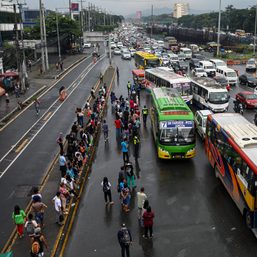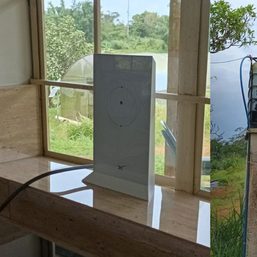SUMMARY
This is AI generated summarization, which may have errors. For context, always refer to the full article.
![[OPINION] Are students actually learning during this pandemic?](https://www.rappler.com/tachyon/2020/09/are-we-really-learning-September-8-2020.jpg)
“Sir, indi ko anay mag-eskwela online kay wala ko kwarta inug pa load. Unahon namon anay amon kalan-on kay ga masakit si tatay (Sir, I can’t go to our online class because I don’t have money to buy load. I need to prioritize our food because my father is sick).”
This is just one of the situations of students in state universities as they embrace the so-called “new normal” in education. Despite efforts of the education sector to continue learning during the pandemic, the “new normal” has continued to be a scourge not only for teachers but also for students.
The COVID-19 pandemic has been shaping the course of education. It has shifted from the more familiar face-to-face setup to the unfamiliar space of online learning, with teachers trying to replicate traditional classroom methods that are now unsuitable.
Despite the problem of student learning and the difficulty of their adjustment during the pandemic, the Commission on Higher Education (CHED) still pushed for the opening of classes like the Department of Education (DepEd), but provided some leniency, saying it will be up to the schools to decide whether they would open in August or October.
Things are not easy when moving pedagogically from one medium to another. The sudden transition brought by the pandemic without adequate opportunities to design for a new medium becomes a struggle for educators and students.
For instance, the shift to synchronous online video-conferencing (such as Skype, Google Meet, or Zoom) creates uncertainty for teachers and students. Because they do not have enough resources to stay online, most of the students – especially in state universities – rely on free Facebook for communication. The burden of data consumption through video conferencing is costly for students who rely on free tuition.
On the teachers’ side, the migration creates a quagmire of problems despite the battery of seminars for adjustment. Still, internet connection remains the number one problem. To address this, some institutions have resorted to module-making or course packs or asynchronous learning. These, along with online video conferencing, have become the standard norm.
However, the same problem arises as module-making and course packs become a struggle because of the demands of the institution. Some institutions hastily forced teachers to produce modules for the sake of having finished products to justify expenditures on teacher salaries and to beat the deadline, given the early class opening. Modules and course packs don’t replicate the actual teaching. This band-aid solution only shows the gaps between the privileged and their underserved counterparts in education.
There is no actual learning in this urgent transition; it is for the sake of completion. The problem in this pedagogical migration is that it leaves the marginalized students with haphazard information, where they are facing complex material, financial, mental, and infrastructural challenges.
Neoliberal values: product-based orientation
The pandemic has become an avenue to forge neoliberal values in education. An academic freeze to make students and teachers feel at ease and safe has been thumbed down by education officials who declared that education must continue despite the pandemic.
This decision to continue classes by any means is, however, more a matter of economics than a mission of education – the number of unemployed will quadruple due to the number of people in private institutions who will lose their jobs at this time. This institutional gesture of pushing through with classes has turned into an oasis for people who need their jobs to live.
Neoliberal values shape and frame the mind of academicians. The pressure to work on their course packs and modules with a limited time frame for the sake of completion, in a Marxist sense, is called “alienation of labor.”
College educators were forced to submit to this kind of system because of their debt of gratitude to the institution. This can, however, also become detrimental because this framing dismisses the dialogue between teachers and their administrators, especially in airing their pleas against reopening or about other problems they encounter in making their course packs.
This kind of framing even covers students whose pleas were denied, too, and who were pressured by their teachers to connect by any means for their online classes. Of course, we know that the majority of students in state universities come from the lower-class strata of society where internet connection is a luxury rather than a necessity. This relationship of top-down decision-making is toxic and creates the impression of an oppressor-oppressed relationship.
Teachers are oppressed and denied by their admins, and in turn, those who are oppressed become oppressors to their students. This corporatization of higher education has also created a product-based orientation. Teachers present the product to the admins and students, and students must return the product that their teachers ask for – a setup more likely based on compliance.
Students’ vulnerability
Students are the most vulnerable in this situation. Before, education was seen as a gateway to a brighter future; now, education is a burden to the poor and an advantage to the affluent.
Private and state universities are still finding stop-gap solutions to provide quality education for all, but quality is heavily dependent on the level and quality of digital access. The less affluent families with limited digital devices are the ones left behind. Besides dealing with budget issues for data plans to cope with their online classes, their mental health is also strained as they cope with learning requirements in this time of crisis. These only exacerbate their learning situation.
Students enroll not because they want to learn, but because they don’t want to be left behind. They attend online classes and answer their modules and course packs, not because they want to learn but because they need to comply with these requirements to get a degree and diploma.
Similarly, teachers do their jobs for the sake of completion mandated by their superiors, even if their heart is not in it. Education in the time of this pandemic is also a pandemic itself. It is not liberating but rather restraining. It is not encouraging but rather depressing.
Education institutions want the best but they forget to become human. As Luis Montenegro said in the movie, It Takes A Man and A Woman: “Minsan sa kagustuhan nating maging magaling, nakakalimutan nating maging mabuti (Sometimes in our desire to be excellent, we forget to be good).” – Rappler.com
Sensei M. Adorador is part of the faculty of the College of Education at Carlos Hilado Memorial State College, Negros Occidental. He is a member of the Congress of Teachers and Educators for Nationalism and Democracy (CONTEND). For comments and suggestions you can reach him at sensei.adorador@chmsc.edu.ph.
Add a comment
How does this make you feel?
![[Time Trowel] Mentorship matters](https://www.rappler.com/tachyon/2024/04/mentorship-matters.jpg?resize=257%2C257&crop_strategy=attention)








![[New School] Regrets and redemption: Notes of a pandemic-time, graduating college senior](https://www.rappler.com/tachyon/2023/05/regrets-redemptions-notes-may-28-2023.jpg?resize=257%2C257&crop=448px%2C0px%2C1080px%2C1080px)
There are no comments yet. Add your comment to start the conversation.